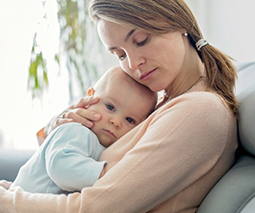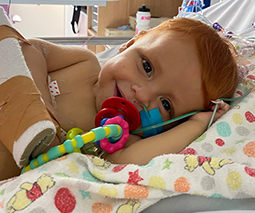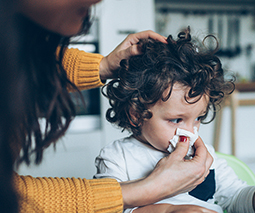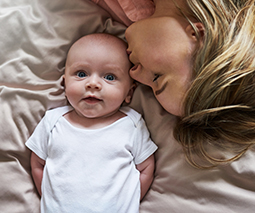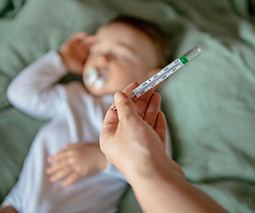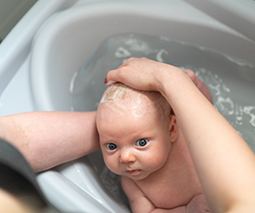I had never heard of bronchiolitis until my baby was in hospital with it
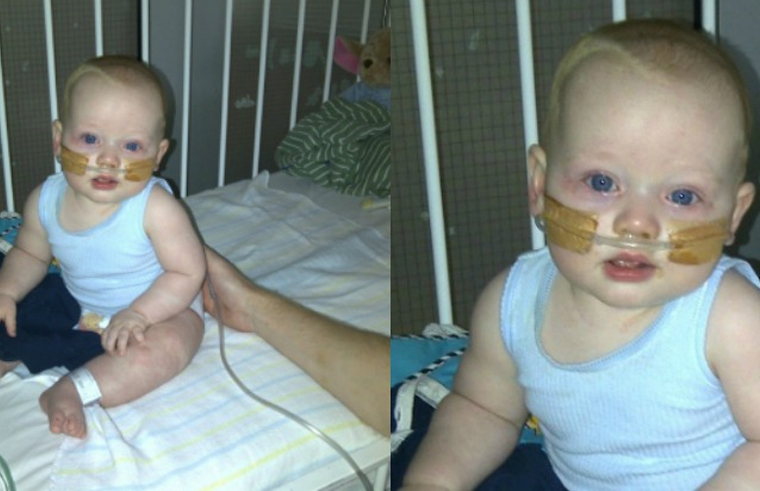
When my first baby was about six months old he spent over a week in hospital struggling to breathe with bronchiolitis. It was the first time I’d ever heard of it but around a third of all babies get it.
A rush to hospital
It started just like a cold – runny nose, irritable, that sort of thing. I didn’t think too much of it and tried to keep my bub as comfortable as possible with lots of cuddles and extra milk. But the symptoms escalated quickly and within a day or two he was also wheezing, having trouble breathing, lethargic and not feeding well. Feeling very worried, my husband and I went to the doctors who advised us to get him to hospital immediately, which we did. Turns out he had chronic bronchiolitis and I spent the following week sleeping next to him in the children’s ward under quarantine, with oxygen and drips helping him breathe and feed. As a new mum, to say it was stressful is an understatement. How could a cold lead to my son’s life being at risk? And why had I never heard of this condition before?
What is bronchiolitis?
A viral chest infection, bronchiolitis is where the smallest air passages to the lungs get inflamed and cause things like coughs, wheezing and interference with breathing. Not to be confused with the more widely known bronchitis (also a viral chest infection), bronchiolitis only occurs in babies – most commonly under six months but sometimes up to the age of two. It’s more prevalent in the winter months and is often caused by another virus such as influenza. Babies delivered by c-section (like my son was) are apparently more susceptible as well.
Mild and severe
Like most viruses, bronchiolitis can present mildly or develop chronically. When a baby has an acute version, it’s highly possible you wouldn’t even know they have it – which is what actually happened with my second son after a doctor check up for a minor cold. And in that instance he didn’t need hospitalisation at all, just rest and care. But when bronchiolitis is chronic, it’s not to be treated lightly as it can cause babies to stop breathing.
How it’s treated
Unfortunately medicine does nothing for a virus like bronchiolitis. When it’s mild you just need to make sure your baby gets lots of rest and liquid so they don’t get dehydrated. Smaller feeds more frequently are best (as feeding could be hard for them), treat any symptoms like fever and runny noses, and keep an eye on their condition in case it begins to worsen. Usually it goes away after a few days though.
When bronchiolitis is chronic the main concern is that the baby might stop breathing. Hospitalisation might be required where they will closely monitor the baby and give oxygen and fluids (via an IV drip) if required – such as the case with my first son. In cases such as this the virus and symptoms can last several weeks.
As with any respiratory illness, do not smoke around your baby as it can make their breathing issues a lot worse.
Signs and symptoms
When bronchiolitis is acute your child may experience the following:
- A mild cough
- Runny nose
- Stuffiness
- Light wheeze
Indications that it might be a more severe case include:
- Poor feeding
- They’re lethargic
- Fast, shallow breathing
- It’s an effort for them to breathe – drawing in of the chest
- Noisy breathing – like wheezing
- Fever
- High heart rate
- Nostril flaring and grunting
Keep an eye on bub
In summary, there’s no need to panic at the first sign of a runny nose, however do closely watch your baby’s condition if they appear to have a cold in case it does develop into something more severe such as bronchiolitis. As I found with my baby, when it comes to sick little ones things can escalate very quickly.
If you are concerned your baby might have bronchiolitis or they’re experiencing any of the more serious symptoms above, please speak to your doctor immediately.
